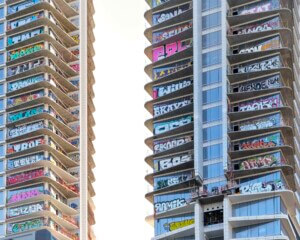Seven years after 5 Pointz, a mecca for graffiti that took over the Neptune Meter factory in Long Island City, was whitewashed and demolished by late developer Jerry Wolkof without prior notice, the artists who lost work there will finally be compensated. On Monday, October 5, the U.S. Supreme Court (SCOTUS) declined to hear an appeal of a lower court ruling that would award $6.75 million in collective damages to affected artists, handing the group a long-sought-after win.
Although Wolkof had owned the site since the 1970s and had freely let street artists tag the vacant buildings there, up to hiring a curator in 2002, his decision in 2013 to replace the entire arts center with a massive condo development immediately drew pushback from the art world. Without warning, Wolkof painted over the building in November of 2013 to, he claimed at the time, take it out in one fell swoop and not have to watch it be dismantled piece-by-piece. Construction of its replacement, a 1.21-million-square-foot residential complex with 1,115 units designed by HTO Architects and also named 5Pointz, followed soon after in 2015, and the enormous project now looms over Long Island City, nearly complete.
Unhappy with losing their work, a group of artists filed a lawsuit against Wolkof’s development company G&M Realty, alleging their rights under the Visual Artists Rights Act (VARA) had been violated. Under VARA, the plaintiffs argued, their work was protected against willful “destruction of a work of recognized stature, and any intentional or grossly negligent destruction of that work is a violation of that right.”
VARA goes on to clarify that external environmental wear and improper handling of artwork is excluded, an important part of the artists’ case; in whitewashing 5 Pointz without prior notification, they claimed, Wolkof intentionally destroyed their work. In November of 2017, a jury agreed with them, and in February of 2018, a Brooklyn Supreme Court judge awarded the group $6.75 million in restitution ($150,000 for each of the 45 pieces destroyed).
G&M Realty then appealed, arguing that VARA’s phrasing of what constitutes protected work is too vague, their defense was shot down by a US Appeals Court this February. By declining to hear G&M Realty’s case, SCOTUS has upheld the lower courts’ rulings and the developer will have to pay out. As is typical of such refusals, SCOTUS declined to provide a reason.











